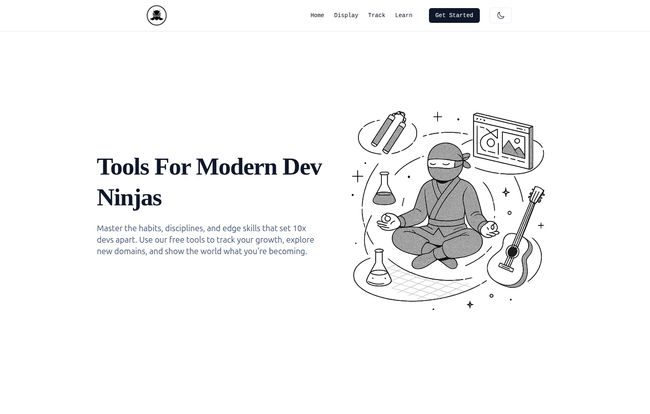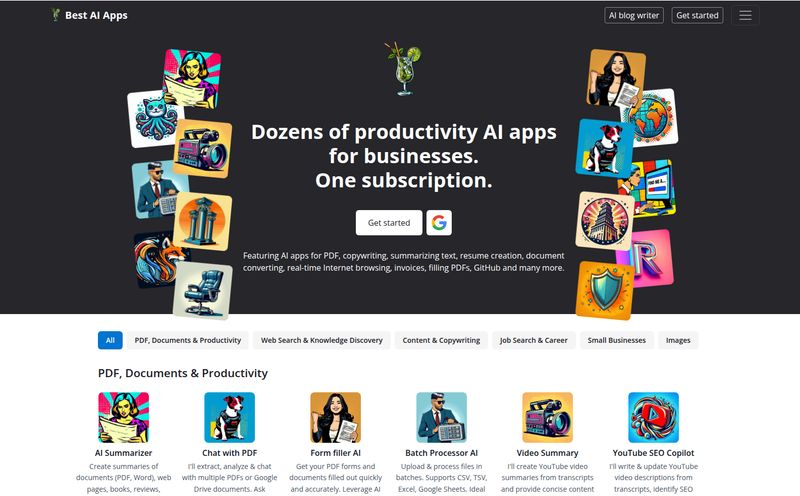As a developer, your resume is a weird beast. It’s not like a sales portfolio or a writer's CV. It’s this strange document that has to be a perfectly formatted, keyword-stuffed billboard for HR bots (hello, ATS), while also being a compelling story of your problem-solving prowess for the hiring manager who actually reads it. It’s a tightrope walk. And most of the time, we fall off.
I’ve seen—and made—my share of boring, list-style resumes. You know the ones: a grocery list of programming languages, a chronological rundown of jobs, maybe a link to a dusty GitHub profile. They're functional, I guess. But they don’t exactly scream “I am a creative, driven engineer who builds cool stuff.”
So when I stumbled across a tool called Ninja in Brazil, my curiosity was definitely piqued. The name alone is something else. But it was the tagline that really got me: “Tools For Modern Dev Ninjas.” It promised to be more than just software; it was a philosophy. A path to becoming a “Polymath.” I had to see what this was all about.
What on Earth is Ninja in Brazil Anyway?
Okay, first thing's first. The homepage talks a lot about becoming a “Polymath”—a developer who thinks deeply and acts deliberately. The actual program and domain, however, is “Ninja in Brazil.” A little confusing? Maybe. But I kind of like the mystique. It feels less like a corporate SaaS product and more like a passion project, which, in my experience, often leads to the most interesting tools.
At its core, Ninja in Brazil is a resume builder specifically for developers. But calling it just that feels like a disservice. It’s framed as a complete development program aimed at ambitious devs. It's built on a foundation of not just showcasing what you've done, but shaping who you are becoming as an engineer.
Instead of just giving you a text editor and some templates, it breaks down the journey of a top-tier developer into three core pillars.
Beyond the Resume: The Three Pillars of a Polymath Dev
This is where Ninja in Brazil starts to differentiate itself from every other resume tool I’ve ever used. It’s not just about the final document. It’s about the process and the person behind it. The whole platform is structured around three ideas: Display, Track, and Learn.
Display: Crafting a Resume That Actually Tells Your Story
This is the part you came for—the resume builder itself. And it’s slick. It guides you to build a resume that doesn’t just list your skills but showcases them. Think of it as building a narrative. You can highlight open-source projects, which is a massive plus. For the developer who wants to show off their Github commits and side projects this is huge.
But here are the features that really caught my eye:
- AI Assistance: Feeling stuck writing your job description? We've all been there. It has an AI assistant to help you craft job titles and descriptions. It's not going to write the whole thing for you, but it's great for breaking through writer's block.
- Custom Domain Hosting: This is a big one for personal branding. Instead of a clunky, shared URL, you can host your live resume on your own domain (e.g., `resume.yourname.com`). It looks professional and gives you complete control.
- Analytics & Session Recordings: This is the part that made the SEO nerd in me light up. You can integrate Google Analytics to see who's visiting your resume, from where, and for how long. Even cooler? It supports session recordings through Inspectlet, so you can literally watch how a recruiter interacts with your resume. Are they clicking your project links? Are they hovering over your skills section? That’s gold. Pure gold.
And, crucially, the final output is designed to be ATS-optimized. It generates a clean, scannable print version that the bots can easily parse. It’s the best of both worlds: a dynamic, impressive web version for humans and a perfectly structured version for the machines.

Visit Ninja in Brazil
Track: Building Habits, Not Just Collecting Skills
Here’s where the “polymath” idea gets legs. Ninja in Brazil includes a system for tracking your growth. You can set weekly goals, log the skills you're learning, and measure your progress over time. It’s a simple concept, but it's powerful.
How many of us have started a Udemy course only to abandon it two weeks later? This feature is designed to combat that, encouraging the discipline and consistency that separates great developers from good ones. It turns professional growth from a vague idea into a tangible, trackable project. It’s a surprisingly thoughtful addition that I haven’t seen in any other career tool.
Learn: The Mindset Behind the Code
This part of the platform is still listed as “Coming Soon,” but the ambition is clear. The goal is to provide content and methodologies for deep learning, rapid skill acquisition, and creative problem-solving. This moves Ninja in Brazil from a tool to a full-blown ecosystem for developer growth.
Honestly, I'm excited to see what they do with this. If they can deliver quality content on how to learn effectively, this platform could become an indispensable resource for junior and mid-level devs looking to level up. It’s a bold promise.
A Closer Look at the Nitty-Gritty Features
Alright, let’s get into the weeds a bit. The high-level philosophy is great, but does the feature set hold up for a modern developer? For the most part, yes.
The ability to properly showcase open-source projects is a standout. It's not just a link; it's a dedicated section. This shows a deep understanding of what matters in the dev world. Your contributions are part of your story, and this tool lets you tell it.
The AI-powered suggestions are more than a gimmick. They're tuned for tech roles, helping you find the right language to describe your work on, say, a microservices refactoring project or a CI/CD pipeline implementation. It’s a smart assistant that speaks your language.
And I have to come back to the analytics and heatmaps. Imagine sending out your resume and knowing that 10 recruiters from FAANG companies viewed it, and 8 of them clicked on your latest project. That's not just an ego boost; it's actionable data. It tells you what's working and what's not. It turns the job application process from a black box into a data-driven campaign. It’s brilliant.
So, What’s the Catch? A Frank Look at the Good and the Not-So-Good
No tool is perfect, right? After playing around with it, here’s my honest take.
On the plus side, the developer-centric design is a breath of fresh air. Everything is built with a software engineer in mind. The custom domain feature is a professional game-changer, and the AI help is genuinely useful. The whole “polymath” angle gives it a purpose that other tools lack. It feels like it was built by devs, for devs.
However, that same strength is also a weakness. This is not for non-developer roles. If you’re in marketing, sales, or design, this isn’t for you. It’s a specialized tool for a specialized field. Also, some of the coolest features, like session recordings, rely on an external integration with Inspectlet. It’s not a huge deal, but it is an extra step.
And then there's the price...
Let's Talk About the Price Tag
This is the part where I usually brace myself. A tool this interesting with custom hosting and AI has to cost something, right? I scoured the site, looked for a pricing page, and found… nothing. It seemed odd.
Then I saw it, tucked away in the footer. A simple, declarative sentence: “Our tools and content are always free. All of them.”
I had to read it twice. Free? All of it? Apparently, yes. For now, at least, Ninja in Brazil is completely free to use. That's an incredible value proposition. I'm not sure what their long-term business model is—perhaps premium features down the road—but as it stands, it’s one of the most generous free tools I’ve come across in a long time.
Frequently Asked Questions
Is Ninja in Brazil really free?
As of right now, yes. The website states that all their tools and content are always free. This includes all the features mentioned, from the resume builder to the custom domain hosting.
Who is this platform best for?
It's designed specifically for software developers, programmers, and engineers. If you write code for a living and want a resume that reflects your technical skills and project work, this tool is tailor-made for you.
How does the AI assistance work?
The AI helps you generate suggestions for things like job titles, bullet points for your responsibilities, and professional summaries. It's a great way to find the right words and overcome writer's block when describing your technical accomplishments.
Can I really use my own custom domain?
Yes. The platform allows you to host your live, interactive resume on a subdomain they provide or on your own personal domain, which is a fantastic feature for personal branding.
What do they mean by a 'Polymath' developer?
Based on their website, a 'Polymath' developer is one who focuses not just on technical skills but also on the habits, disciplines, and mindset for continuous growth. It's about thinking deeply, learning effectively, and building a sustainable, lifelong career in tech.
Is this just another resume builder?
While its main feature is a resume builder, its philosophy is much broader. With features for tracking skills and goals, and planned content for learning methodologies, it aims to be a holistic career growth platform, not just a document creator.
Final Thoughts: More Than Just a Tool
So, is Ninja in Brazil the future of developer resumes? Maybe. It's definitely a bold step in the right direction. It understands that a developer's resume is more than a piece of paper—it's a living document, a personal brand, and a story of growth.
It’s not for everyone. But for the developer who is intentional about their craft and their career, it’s a fascinating and, frankly, powerful platform. The fact that it's free is just the icing on the cake.
It’s a tool that respects the user's intelligence and ambition. And in a world of generic, one-size-fits-all solutions, that's something worth paying attention to.



